|
Other feature stories: Crazy about Syd • The Legend of Syd Barrett • A Floyd Fan's Intro to Trans-Siberian Orchestra • Roger & Me With EXCLUSIVE Roger Waters interview transcript The man and my journey: one fan's discovery of Syd Barrett by
Jacki Dimitroff My introduction to Pink Floyd was a chance event: hanging out with friends one rainy evening in a car and someone put in a new tape. It was Wish You Were Here. At the time, I knew very little about Pink Floyd (oh yeah, they did "Money," right?), but that night, as I listened to "Shine on You Crazy Diamond" and heard those lone, plaintive notes from the guitar, I knew music would never be the same for me. What I didn't know was that those lone, plaintive notes were something called "Syd's Theme," and those notes didn't represent me, but a real person who once led a very young Pink Floyd. It would be another chance event, many years later that led me on a journey to discover Syd Barrett. Tossed in as a filler on a Pink Floyd bootleg was a cover of "Dark Globe," and again I felt an immediate connection to the music the same way I had the first time I heard "Shine on You Crazy Diamond." There was only one difference; I already knew quite a bit about Syd Barrett when I first heard that cover. I knew some of his music, I knew his history with the band, and I knew he eventually fell into the psychotic state of schizophrenia. Whether or not this condition was drug induced is still up for debate, and is not really relevant. But the question becomes this: is Syd Barrett noteworthy simply because of his association with Pink Floyd, or does he have merit on his own? In going through the Barrett catalogue (including the Pink Floyd singles, Piper at the Gates of Dawn, and some unreleased material), I had to ask myself what honestly fascinates me about this man and his music. I feared the worst: that it was some morbid curiosity like rubbernecking at the scene of an auto accident. Was I truly intrigued by this music or just looking on grotesquely as Barrett's hold on reality slipped away?
The black and green scarecrow is sadder than me This emotional commentary juxtaposed with a playful tune would become a staple of Barrett's songwriting. To me, Piper represents Barrett's playground. The music is full of a sense of fun and youth. While the singles were very successful, the release of Piper introduced the world to the young creative genius of Syd Barrett. Sadly, Pink Floyd's next release, A Saucerful of Secrets, had only one writing credit to Barrett: "Jugband Blues", and it appears from the lyrics that everyone, including Barrett, knew that his sanity was slipping, and that his time with the band was over: It's awfully considerate of you to think of me here What happened between the two albums that led to Barrett's eventual release from Pink Floyd is well documented, and again, not relevant here. But Barrett continued his musical career, although briefly, and continued to produce music that is whimsical, profound, and entirely individual. What I discovered from enjoying and analyzing Syd's work is that his music contains some intense clarity set forth in the most simplistic ways, and I would see this as a recurrent aspect of his songwriting style. This opinion may surprise some, but only those who bring very little of themselves to the music. It is my opinion that Barrett must be understood on a very personal level, sharing emotions and experiences with the music. Otherwise, the audience is limiting itself--and Syd Barrett. Syd Barrett released two solo albums after his association with Pink Floyd ended. The first, The Madcap Laughs, is full of that imaginative experimental whimsy I recognized from Piper at the Gates of Dawn. One of my favorites, "Here I Go," is musically striking and lyrically revealing. Barrett opened the door to his emotions and allowed the listener to peek in: I hoped that she would talk to me now Another one of my favorites is "Late Night" because of its clarity. "Late Night" is an exercise in projection, and it just floats there like a mood. With a single image, Barrett revealed his knowledge of his changing psyche and his struggle to maintain sanity: Inside
me I feel alone and unreal
Released in 1970, Barrett's second solo album, Barrett, continued that same aspect of clarity. I also begin to see two reemerging themes: self-reproach and a love for simplicity. Barrett created the ultimate song of self-reproach with his composition "Vegetable Man", which pokes fun at his attire. Composed and produced in 1967, this song was unfortunately never released, but Barrett continued the concept, more seriously this time, with the song "Rats:" Rats, rats lay down flat Through his lyrics and the music, Barrett preached to recognize the joy in everyday love, versus the Michael Bolton I'm-gonna-have-a-hernia-screaming-about-this-passion love. In songs such as "Waving My Arms in the Air" Barrett celebrated his view of the important aspects of love: ...with
her slinky look The song "Dominoes" is another piece of mood, painting a melancholy portrait of a lazy warm love that is somehow lost to Barrett. Symbolizing this love with the table game establishes the theme of simplicity, and the musical delivery is quiet and repetitive, almost boring. Again, the image is strikingly clear in its simple delivery.
The tiger came and said 'Who me?! With 1989 came the release of Opel, a compilation of outtakes and alternate versions from the archives of the Abbey Road studios. While the newly released works are true to the themes of self-reproach and simplicity, the title piece shows a lucidity shared only by "Jugband Blues" or "Dark Globe." The lyrics and musical imagery place the listener on a warm beach: The pebble that stood alone And comfortably there, Barrett shares an insight into his changing psyche: I'm trying I'm trying to find you! This is where Barrett was at his best. He'd create a comfortable atmosphere, and then drop an intellectual bomb on you.
Take life easy why so empty ...? On first impression, it is easy to dismiss Barrett's works as the rambling of a madman or acid freak. In some cases, the lyrics appear disjointed and unrelated to any particular theme. Some of his musical compositions have a slow, plodding tone with very little variety in the structure. But this is where the listener must become an active participant. Without one's own personal emotions and experiences mixed into the formula, some of Barrett's music will definitely fail to connect. For example, the song "Untitled Words" from Barrett initially appears as nothing more than a Webster's peruse rant until the final three lines: inflect,
impression, loom, last, Here is my interpretation of these three lines: If you look inward you will find looming, lasting impressions that are hot with passion. Meet yourself in the third person. And in the light of inspection, fear the signal that you stand alone with nothing but the empathy of cold coral. Though I will never know if this was Syd's "message" or one I just created in my own mind, it goes to the heart of Syd's mystery and the appreciation of him as an artist. One day you may hear inane ramblings and the next day the same song will share some deep magical connection with you. While wrestling with mental isolation, Barrett continued a musical career, although briefly, that was quite different from the musical direction that Pink Floyd would take. Barrett's music remained more true to the style of the early singles and Piper at the Gates of Dawn, while Pink Floyd developed and originated the "concept" album. But it is reported that Barrett wanted The Madcap Laughs to be a "concept" piece, although it didn't turn out that way. Still Barrett remained, as through his brief association with the band, as dedicated to illuminating the nuances of love and life and as dedicated to introspection as The Wall was to Roger Waters. In fact, The Wall is a great analogy. While Waters built a complex opus around the perceived sins and crimes of others, Barrett used a more simplistic style and accentuated his own shortcomings. Barrett's music encompasses astounding moments of clarity, mind-sharp imagery, an appreciation of the simpler things in life, self-humility and yes, an understanding that all was not right with his mental state. Moments of apparent lyrical tripe or dull and droning musical composition require an injection of personal experience to comprehend in the fullest form. So is Syd Barrett noteworthy because of his association with Pink Floyd, or does he have merit on his own?
I say there is definite merit to Barrett's solo works, along with the music he created with Pink Floyd. To dismiss Barrett's music as a sign of drug over-use or schizophrenia is equal to dismissing the creative process in every one. But to answer my initial concerns, Barrett is worthy of musical listen both because of his artistry and because of his descent into madness. Despite the ingenuity of his compositions, I cannot dismiss the insight into the slipping psychotic mind that Barrett shared with us in his music. In other words, Barrett's complete works display that there are times when the madcap laughs, and there are times when he struggles. My feelings about Syd can be summed up in Barrett's own words, from "Terrapin" on The Madcap Laughs: Well, oh baby, my hair's on end about you....
Jacki Dimitroff is a staff writer for Spare Bricks.
by Mike McInnis What on Earth do you do? All of the remaining Floyds have, over the years, reflected upon the fate of poor old Syd. David Gilmour once said, "I just don't think he could deal with the vision of success and all the things that went with it." And Waters said in 1975, "It couldn't have happened without him but on the other hand it couldn't have gone on with him." Waters and Barrett weren't the greatest of friends, by most accounts, but the Floyds, like the fans, idolized and revered him, it seems. And he was their leader, in a lot of ways. Their world was celebrating all that was creative and different and odd, and Barrett was working very hard at being different. They took their cues from him, in a way. But then they realized that Barrett wasn't just being clever and strange. He was being erratic, psychotic. He could not function in the real world. He left commitments unfulfilled, wrote songs that were clearly not going to lead the band to success, and generally lost touch. Imagine watching a close friend–a brother, a role model–go through this gradual decay. Imagine reading about this friend in the fawning music papers, and knowing that the reality of the situation was much scarier. Imagine hearing whispered murmurs about how this friend was cracking up, and how he was dragging the band down with him. And without the benefit of hindsight, which proves that leaving Barrett behind would pave the way for success beyond their wildest dreams, imagine what anguish it must have been to dump this friend and go off on your own, while all the world said you'd never make it without him. And maybe if Wright and Gilmour had taken more time to put their thoughts and feelings and souls into the songs they wrote, we might know a bit more about how they felt. But they didn't. Roger Waters did. With a vengeance. Barrett's forced departure from the band left a huge vacuum, and Waters was the one who filled the void, eventually. And in doing so, Waters turned to themes of insanity time and time again. It was as though the images of Barrett's slow decay had burned themselves forever into Waters' mind, coloring everything he saw from that point on, and forming a framework for everything that came after. The English have a stereotypical affection for eccentrics, and there is something charming about the way they throw about terms like 'mad'. It makes mental illness sound so innocuous, so trivial. But Waters' view of insanity is much, much darker.
Insanity wasn't just something that you read about in novels or see on TV--it was something very real to Waters. He had watched his friend go insane, and feared that it would happen to him. "If I go insane," he wrote, "please don't stick your wires in my brain." "If" is a reflective song, one of the most personal songs Waters had written to date. He had seen how the world shunned Barrett, and hoped that he would never suffer the same fate. "And if I go insane, and they lock me away, will you still let me join in the game?" he asks, knowing full well that he had been complicit in excluding the ailing Barrett from the Floyd's "game". But here he seems to have grown, and he seems regretful to have treated his friend so badly. By 1972, madness had begun to really weigh heavily on Waters' creative mind. The suite which eventually became The Dark Side of the Moon was conceived as a reflection on life's pressures which act to drive men crazy. The album was filled with references to insanity: howling laughter, quiet voices (like the hallucinations echoing in a madman's ears?) saying things like "I've always been mad", and lyrics like "There's someone in my head, but it's not me". "The lunatic," he sings, "is in my head," and for the first time we see Waters identifying himself with his tortured friend Barrett. 'We are all ultimately driven insane' the album seems to say. Even the album's title hints at the importance of insanity. The moon, of course, has long been associated with madness (hence the term "lunatic", which comes from the same root as "lunar"), and the 'dark side' of one's soul is that which is morbid, deranged, hidden from the world. Combining these two phrases leads us to something beyond mere astronomy; the 'dark side of the moon' suggests the maddest part of madness. You might have thought that writing an entire album about the causes of madness in modern life would have helped Waters purge whatever feelings of guilt he might have had about Barrett. But that was apparently not the case. When Pink Floyd emerged to tour again in 1974, all of their new material dealt with insanity in one way or another. First there was "Raving and Drooling", a noisy, manic outburst of psychotic rage. ("How does it feel to be empty and angry and spaced?" asks Waters' raving lunatic.) Then there was "You've Gotta Be Crazy", which was calmer, and seemed to look at life in the world of the dog-eat-dog working class, in which lies and deceit were commonplace. To conform to such a life requires a certain amount of insanity, and Waters seems to say that we are all caught up in it–we are all insane by degrees. The third new composition, "Shine On you Crazy Diamond", had madness in its title as well, and here Waters was quite obviously looking at Barrett's madness directly. Barrett had been an innocent youth when he was thrust into stardom, and that cynical dog-eat-dog world had driven him quite insane. But Waters, ever the pessimist, still sees a bit of the madman in himself. "Pile on many more layers, and I'll be joining you there," he sang, indicating that he thought he would eventually match Barrett's madness. The Wish You Were Here album, which featured "Shine On", dealt with Barrett's legacy in tunes like "Welcome to the Machine", in which Waters alluded to the way that the music industry Machine ruined the innocence of geniuses like Barrett. And while "Have a Cigar" seems to be rooted more in the post-Syd Floyd's phenomenal successes, the combination is damning of the music industry. As quoted above, the final verse of "Shine On", which closes the album, ties Barrett's and Waters' fates together, and shows that Waters seems to think he and Barrett were, on some level, kindred spirits.
This union of Barrett and Waters became even more pronounced during the various productions of The Wall. The character of Pink is clearly fictional, but borrows heavily from both Barrett's and Waters' stories. It was Waters' father who died during World War II at Anzio, and it was Waters who had struggled to keep a marriage alive while touring the world as a rock star. But Barrett had cracked up in ways that turned up in Pink's story--he had behaved erratically, shaved off his eyebrows, failed to show up for gigs, refused to perform, tormented a female friend, and succumbed to devastating drug abuse. It is easy to look at The Wall as being primarily a Waters autobiography, but doing so denies the undeniable: that 'Pink' was an amalgam of Waters and Barrett. Waters, who remained an obscure figure, never really lived the rock god lifestyle that had helped destroy Barrett, and in some ways he used the Pink character to project himself into this lifestyle. But Pink's madness and withdrawal from reality seems very much inspired by Barrett's. "Crazy... they must have taken my marbles away," Pink says--he recognizes his own insanity, and seems to break free from it at the album's end. It is a very positive, hopeful conclusion. Barrett's fans constantly seem hopeful that he will someday break free of his insanity as successfully as Pink was able to do. They dream of a return to music, a triumphant reunion with the band he helped found, one last tour. And perhaps Waters hopes for the same--during his last 3 tours (in 1987, 1999, and 2000), he has used images of Barrett and dedicated songs to his old friend. But he seems to have put the specter of madness behind him. None of his work since The Wall deals with madness in any serious way. Waters seems to have accepted that while the world may be an unpleasant place, madness isn't our final common destination, and that striving to make it more pleasant is far more productive than merely complaining about it.
Mike McInnis is a staff writer for Spare Bricks.
by Colin Turner I first 'met' Syd in late 1966, (or it could have been early 1967). The then-unheard-of Pink Floyd was appearing at what I think was the first night of the UFO Club in London, and as luck would have it, I was there. It's fair to say that Syd didn't make that much of an impression on me the first few times I saw him and the Floyd. I was aware that the band had a leader, because it was always the same guy who announced the songs, did the lead-ins, and seemed to be orchestrating the band. As to who he was, or what his name was, I had no idea at the time. The Floyd had intrigued me from the very first time I saw them and so between 1966/67 to 1970 I made it a habit to go out of my way to try to get to see as many shows as I could. As time went on I became aware of the names of the guys in the band, but I really have to say that I was more interested in the music than the musicians themselves at that time. The crowd I ran with were very taken by the music, and by the entire underground scene. Besides the Floyds, The Crazy World of Arthur Brown and The Soft Machine were some of our favourites, as were The Social Deviants, Tomorrow, Procol Harum, and, a bit later on, Edgar Broughton. There of course were many others but those listed above were really playing the same circuits as the Floyd and as such, I suppose they were competitors, although we never really thought about it that way. Looking back, few of these groups had the long-term mass appeal of groups like The Beatles, The Doors, or Jimi Hendrix. Hendrix was really always considered to be 'mainstream' by the London underground. Even though his music was certainly underground and he moved in those circles, he was almost an overnight sensation in terms of popularity. Same with The Who and The Move, both of whom had been on other scenes before they found Flower Power. Even the Rolling Stones gave Flower Power a bash. Actually, come to think about it, The Beatles were the same: they had a HUGE career before Flower Power but when they joined in they became one of the two leaders of Flower Power--the other being The Floyd. From the first few times I saw the Floyd, it was evident that Syd was the front man, in that he did most of the singing and played lead guitar, but apart from his improvisation work, he didn't really stand out. I think probably because at that time, I was really into was Rick was doing. In the early days of UFO, before the Floyd started to get really popular, the band would improvise a lot. They never played the same song the same way twice. For example "Astronomy Domine" could go on anywhere between 10 to 40 minutes! Syd was responsible for a lot of the improvisations. The band would play the basic theme of the song and then Syd would start to do his thing, leaving the others (except Nick who provided a basic drum beat) to lounge around on the stage, smoking a cigarette or a joint. (Smoking joints was the norm at UFO). This could go on for up to 30 minutes before Syd would decide he had had enough and it was time for the others to join back in. They were also experimenting with what I suppose you could call modern jazz. I think Syd figured this meant he could play any old rubbish, and many times he did! On 29 April 1967 the now famous 14-Hour Technicolour Dream was held at the Alexandra Palace in London. To the best on my recollection this was between the release of "Arnold Layne" and "See Emily Play". To illustrate just what an influence Syd had become, I will quote my own written account of the event: "I do remember the atmosphere was electric. Floyd played as gods, probably sensing that this was a very special time. There was an extraordinary connection between the band and the audience, it was as if the guys had suddenly realised that they had become great musicians but wanted to hang on to the lives they were used to, but knew at this point that there was no turning back. Then the magic happened. Syd's mirror-disc telecaster caught the dawn's pink light. Syd noticed this and with drug-filled eyes blazing, he made his guitar talk louder and louder, higher and higher as he reflected the light into the eyes of his audience and christened those of us lucky enough to be there 'followers of Pink Floyd for life'". A lot has been written about his deterioration around this time but I never really noticed it. They all appeared to be totally smashed off their heads just about every time I saw them. So Syd acting strange was really the norm! Other memories are really hazy. I occasionally have a flashback to those days and recently remembered a night (which was presumably not long after the release of "See Emily Play") when the guys played both "Arnold Layne" and "See Emily Play". As I say, the memories are really dim, but I do recall not being able to move at UFO that night. The word was out on the street that here was a really good 'pop' band. Little did the 'teenybopper' fan that attended that night know what they were really in for! It's now well known that Syd left the band in early 1968 to be replaced by David Gilmour. It didn't really create great ripples in the circles I was moving in, because musicians were coming and going in different bands all the time. I guess time has made Syd Barrett a legend and it is indeed a tragic story, but I have to say (and I know this may upset some) that Syd Barrett's legend was only born many years after he left the Floyd. It just wasn't that relevant at that time.
Colin Turner, a Brit by birth, now resides in Australia, where he maintains "A Fleeting Glimpse" , one of the largest Pink Floyd websites, where many more accounts of his memories of the Floyd's early days can be found. Colin is a guest contributor to Spare Bricks.
|

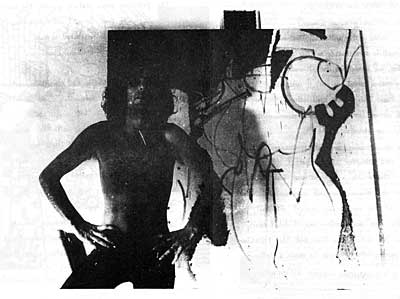
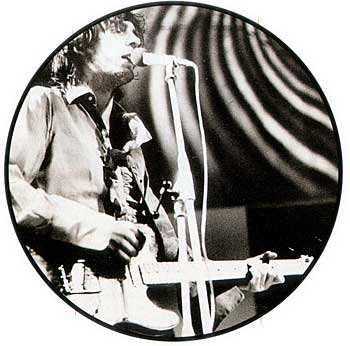 Syd
Barrett was the primary creative force behind the newly formed Pink
Floyd. He wrote the first commercial singles, "Arnold Layne" and "See
Emily Play." Their first album, Piper at the Gates of Dawn, was
entirely written by Barrett with the exception of one song. Barrett's
work on Piper showed great range and promise for the young talent.
"Astronomy Domine," which continued on the Pink Floyd live setlist
for years, displayed Barrett's ability to create an atmosphere with
words and music. "Flaming" breezes through a warm acid trip. The instrumental
piece "Interstellar Overdrive" (another Floyd live favorite), underscored
the daring experimentation that defined late-sixties pop music. My personal
favorite on this album, "Scarecrow," exemplifies Barrett's ability to
use every element of a performance to create the perfect imagery. The
lyrics, sung in almost a monotone, ride over little more than light
percussion, creating the image of a scarecrow, an inanimate, somewhat
wooden object that is the subject of the song. But there is another
layer to this seemingly simplistic observation of a scarecrow in a field:
Syd
Barrett was the primary creative force behind the newly formed Pink
Floyd. He wrote the first commercial singles, "Arnold Layne" and "See
Emily Play." Their first album, Piper at the Gates of Dawn, was
entirely written by Barrett with the exception of one song. Barrett's
work on Piper showed great range and promise for the young talent.
"Astronomy Domine," which continued on the Pink Floyd live setlist
for years, displayed Barrett's ability to create an atmosphere with
words and music. "Flaming" breezes through a warm acid trip. The instrumental
piece "Interstellar Overdrive" (another Floyd live favorite), underscored
the daring experimentation that defined late-sixties pop music. My personal
favorite on this album, "Scarecrow," exemplifies Barrett's ability to
use every element of a performance to create the perfect imagery. The
lyrics, sung in almost a monotone, ride over little more than light
percussion, creating the image of a scarecrow, an inanimate, somewhat
wooden object that is the subject of the song. But there is another
layer to this seemingly simplistic observation of a scarecrow in a field:
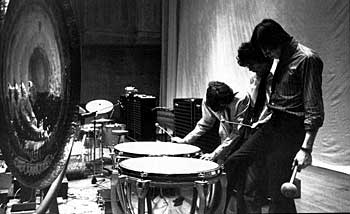 And
then there is what I consider to be the highlight of this work, "Dark
Globe." Deep in the context of Syd's diminishing hold on reality, this
song uses everything to pull all that emotion into a single sentence:
"wouldn't you miss me at all?" Barrett sang this tune with a sense of
panic, as though he was more afraid of the question than the answer.
This original version of "Dark Globe" seems full of panic to me, as
though Barrett fears obscurity. In versions recorded at the same time,
but released later, however, Barrett seems to accept that life moves
on, and sometimes without you. But the song raises a primal emotion:
did I make a difference? This sort of reflection is the worst to ponder.
And
then there is what I consider to be the highlight of this work, "Dark
Globe." Deep in the context of Syd's diminishing hold on reality, this
song uses everything to pull all that emotion into a single sentence:
"wouldn't you miss me at all?" Barrett sang this tune with a sense of
panic, as though he was more afraid of the question than the answer.
This original version of "Dark Globe" seems full of panic to me, as
though Barrett fears obscurity. In versions recorded at the same time,
but released later, however, Barrett seems to accept that life moves
on, and sometimes without you. But the song raises a primal emotion:
did I make a difference? This sort of reflection is the worst to ponder.
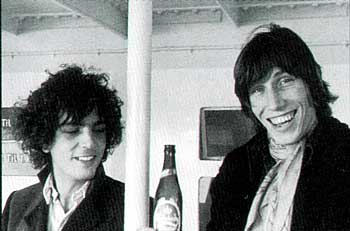 Barrett
also made a significant social statement with his second release. Musically
lacking the playfulness of the other tunes, the songs "Rats" and "Wolfpack"
have a sense of frightened urgency in their composition, as though Barrett
is warning us about an aspect of society only his tilted mind could
see. The songs use animals as symbols for the destructive side of human
nature or perhaps a human side that Barrett's psyche could not tolerate.
And then he summed up his view, with that simplistic quality of his,
with another jovial tune called "Effervescing Elephant," that describes
the jungle food chain, reminiscent of the human social structure:
Barrett
also made a significant social statement with his second release. Musically
lacking the playfulness of the other tunes, the songs "Rats" and "Wolfpack"
have a sense of frightened urgency in their composition, as though Barrett
is warning us about an aspect of society only his tilted mind could
see. The songs use animals as symbols for the destructive side of human
nature or perhaps a human side that Barrett's psyche could not tolerate.
And then he summed up his view, with that simplistic quality of his,
with another jovial tune called "Effervescing Elephant," that describes
the jungle food chain, reminiscent of the human social structure:  The
newly released songs sit well with the idea that Barrett recognized
his altered state. In the tune "Birdie Hop," Barrett repeats the phrase
"I see the flies." And the song "Milky Way" bounces along in innocent
folly only to land on the closing lyrics:
The
newly released songs sit well with the idea that Barrett recognized
his altered state. In the tune "Birdie Hop," Barrett repeats the phrase
"I see the flies." And the song "Milky Way" bounces along in innocent
folly only to land on the closing lyrics: 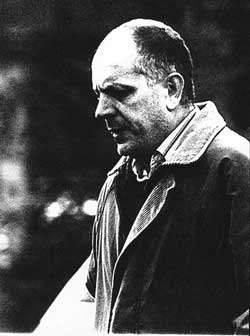 Yes,
Syd Barrett is noteworthy because of his association with Pink Floyd,
but Pink Floyd is noteworthy because of its association with Syd Barrett.
While he began as the band's artistic navigator, his life experiences
solidified him as Pink Floyd's artistic compass. If not for their window-view
of Syd's decent into psychosis, would there be a Dark Side of the
Moon? Could they have composed "Shine on You Crazy Diamond" using
another source for inspiration? Is it possible that Roger Waters could
have completed The Wall had he not seen what celebrity did to Syd Barrett?
Is it conceivable that Barrett taught the Pink Floyd the art of storytelling
and imagery and musical composition in its most simplistic terms, so
the band could develop these skills more intricately?
Yes,
Syd Barrett is noteworthy because of his association with Pink Floyd,
but Pink Floyd is noteworthy because of its association with Syd Barrett.
While he began as the band's artistic navigator, his life experiences
solidified him as Pink Floyd's artistic compass. If not for their window-view
of Syd's decent into psychosis, would there be a Dark Side of the
Moon? Could they have composed "Shine on You Crazy Diamond" using
another source for inspiration? Is it possible that Roger Waters could
have completed The Wall had he not seen what celebrity did to Syd Barrett?
Is it conceivable that Barrett taught the Pink Floyd the art of storytelling
and imagery and musical composition in its most simplistic terms, so
the band could develop these skills more intricately?  You're
Roger Waters, and it's early 1968, and you've just kicked your good
friend out of the band that was essentially his, primarily because
his behavior was getting odder and odder, the songs he was writing were
getting goofier and goofier, and because his guitar playing and singing
were containing less and less actual music than noise. (Okay, so that
noise stuff wasn't so bad, provided that he could at least play something
recognizable at the beginning and end of each number.)
You're
Roger Waters, and it's early 1968, and you've just kicked your good
friend out of the band that was essentially his, primarily because
his behavior was getting odder and odder, the songs he was writing were
getting goofier and goofier, and because his guitar playing and singing
were containing less and less actual music than noise. (Okay, so that
noise stuff wasn't so bad, provided that he could at least play something
recognizable at the beginning and end of each number.) 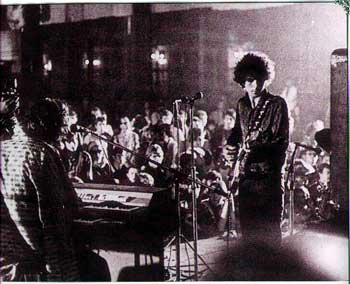 Roger
Keith Barrett was born on January 6, 1946. Just 4 months later I arrived
in this world.
Roger
Keith Barrett was born on January 6, 1946. Just 4 months later I arrived
in this world.